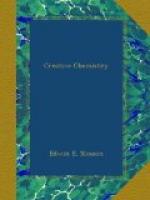Today, as always, men are willing to pay high for the titillation of the senses of smell and taste. The African savage will trade off an ivory tusk for a piece of soap reeking with synthetic musk. The clubman will pay $10 for a bottle of wine which consists mostly of water with about ten per cent. of alcohol, worth a cent or two, but contains an unweighable amount of the “bouquet” that can only be produced on the sunny slopes of Champagne or in the valley of the Rhine. But very likely the reader is quite as extravagant, for when one buys the natural violet perfumery he is paying at the rate of more than $10,000 a pound for the odoriferous oil it contains; the rest is mere water and alcohol. But you would not want the pure undiluted oil if you could get it, for it is unendurable. A single whiff of it paralyzes your sense of smell for a time just as a loud noise deafens you.
Of the five senses, three are physical and two chemical. By touch we discern pressures and surface textures. By hearing we receive impressions of certain air waves and by sight of certain ether waves. But smell and taste lead us to the heart of the molecule and enable us to tell how the atoms are put together. These twin senses stand like sentries at the portals of the body, where they closely scrutinize everything that enters. Sounds and sights may be disagreeable, but they are never fatal. A man can live in a boiler factory or in a cubist art gallery, but he cannot live in a room containing hydrogen sulfide. Since it is more important to be warned of danger than guided to delights our senses are made more sensitive to pain than pleasure. We can detect by the smell one two-millionth of a milligram of oil of roses or musk, but we can detect one two-billionth of a milligram of mercaptan, which is the vilest smelling compound that man has so far invented. If you do not know how much a milligram is consider a drop picked up by the point of a needle and imagine that divided into two billion parts. Also try to estimate the weight of the odorous particles that guide a dog to the fox or warn a deer of the presence of man. The unaided nostril can rival the spectroscope in the detection and analysis of unweighable amounts of matter.




